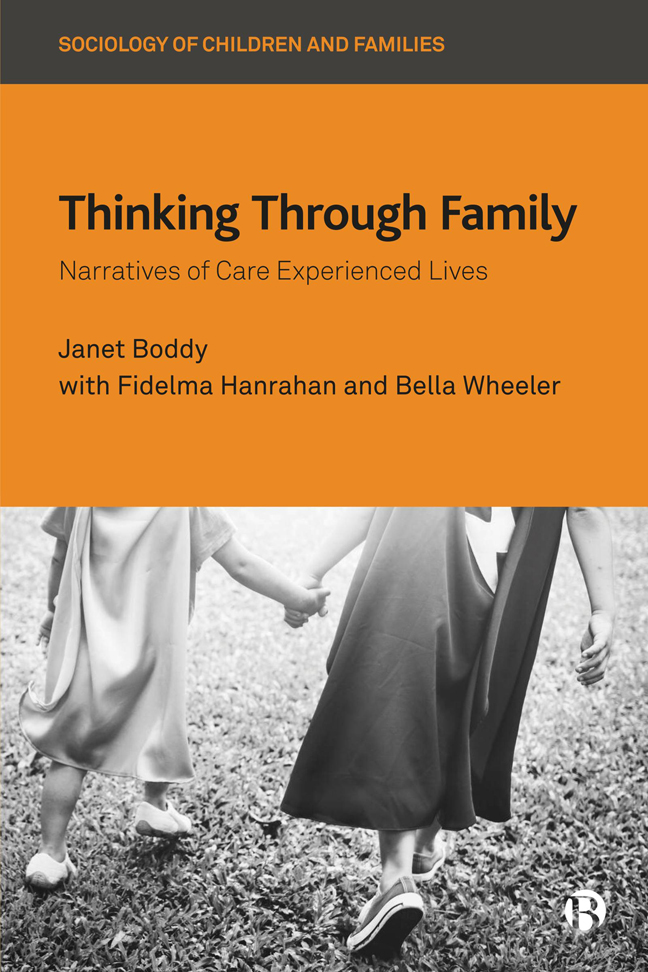Book contents
- Frontmatter
- Sensitive Content in this Book
- Dedication
- Miscellaneous Frontmatter
- Contents
- List of Figures and Table
- Acknowledgements
- 1 Why Think Through ‘Family’?
- 2 Learning From Care Experienced Perspectives
- 3 Doing Family: The Significance of the ‘Ordinary’
- 4 Re/Configuring Boundaries: Who Counts as ‘Family’?
- 5 ‘How Can We Not Talk about Family When Family's All That We’ve Got?’: Care and Connectedness
- 6 Understandings and Experiences of Parenthood
- 7 Thinking Through Family: Implications for Theory and Practice
- Notes
- References
- Index
3 - Doing Family: The Significance of the ‘Ordinary’
Published online by Cambridge University Press: 24 January 2024
- Frontmatter
- Sensitive Content in this Book
- Dedication
- Miscellaneous Frontmatter
- Contents
- List of Figures and Table
- Acknowledgements
- 1 Why Think Through ‘Family’?
- 2 Learning From Care Experienced Perspectives
- 3 Doing Family: The Significance of the ‘Ordinary’
- 4 Re/Configuring Boundaries: Who Counts as ‘Family’?
- 5 ‘How Can We Not Talk about Family When Family's All That We’ve Got?’: Care and Connectedness
- 6 Understandings and Experiences of Parenthood
- 7 Thinking Through Family: Implications for Theory and Practice
- Notes
- References
- Index
Summary
A whole set of what appears to be trivial or even meaningless activities is given meaning through its being grouped together under one single label, that of family. The focus on doing, on activities, moves us away from ideas of the family as relatively static structures or sets of positions or statuses.
David Morgan, Rethinking Family Practices, 2011, p 6Introduction
Undeniably, people who have been in care have often faced significant challenges within their family lives and that is certainly true for the participants in the two studies on which this book is based. But equally striking in both studies were apparently mundane accounts of quotidian or habitual family practices. In this chapter, we focus on participants’ narratives of everyday family practices, to reflect on the significance of the ordinary for understanding ‘family’. This is important for several reasons. Focusing only on adversity or care-specific experiences risks reinforcing the ‘single story’ discussed in Chapter 1. When we focus only on difficulties, we risk creating what Steedman (2000, p 36) describes as the bourgeois construction of the ‘suffering and enduring other, using the themes and items of other, dispossessed and difficult lives’. If we reduce the complex lives and relationships of care experienced people and families to the difficulties they have faced, we replicate the binary construction of the normative imaginary of the ‘ordinary’ family and the problematic ‘other’ – the ‘the objects or abjects of stigma’, to paraphrase Tyler (2013, p 26). To move beyond such binaries, we need to think through the complex relationality of ‘family’ for people who have been in care. That means we need to pay attention to ordinary aspects of care experienced family lives, as well as what is distinctive, in ways that allow us to question what ‘ordinary’ means.
The argument for attention to quotidian family lives can also be made in relation to the social pedagogic concept of lifeworld orientation (see Grunwald and Thiersch, 2009), whereby the lifeworld (or everyday-world) experiences of an individual are the key reference point for praxis: ‘The lifeworld and the everyday manifest themselves as primary and fundamental dimensions of human life situations in all their meaning and dignity’ (Grunwald and Thiersch, 2009, p 133).
- Type
- Chapter
- Information
- Thinking through FamilyNarratives of Care Experienced Lives, pp. 43 - 69Publisher: Bristol University PressPrint publication year: 2023



